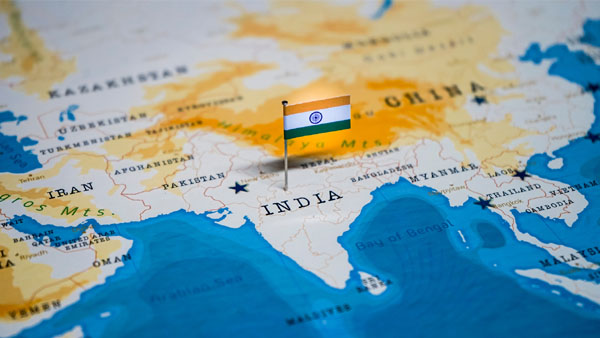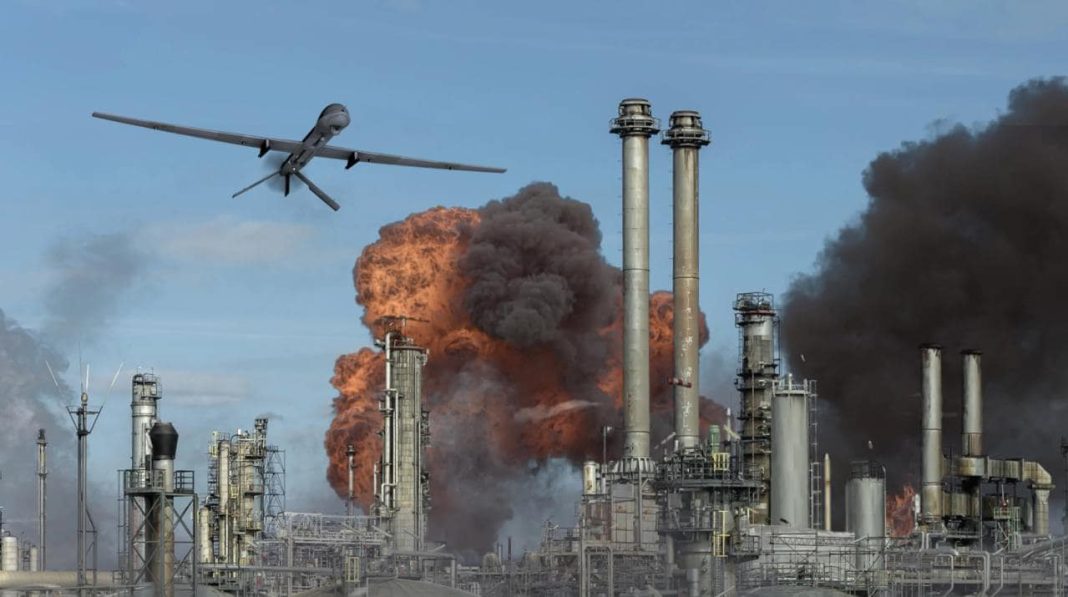By Satyabrat Borah
The recent alignment of Pakistan, Turkey, and Azerbaijan has emerged as a significant geopolitical development, raising concerns about a coordinated strategy targeting India and its allies. This tripartite alliance, formed in the wake of a brief but intense four-day conflict between India and Pakistan during Operation Sindoor, signals a concerted effort to counter India’s growing influence in the region. The conflict exposed vulnerabilities in the military capabilities of Pakistan, Turkey, and Azerbaijan, particularly Turkey’s much-vaunted drone technology, prompting the trio to recalibrate their approach. The meeting between Turkish President Recep Tayyip Erdogan, Pakistani Prime Minister Shehbaz Sharif, and Azerbaijani President Ilham Aliyev has further solidified their commitment to deepening defense cooperation, with a clear focus on challenging India and its strategic partners, including Greece, Armenia, and Cyprus. This evolving dynamic, centered around territorial ambitions and military posturing, has far-reaching implications for regional stability and global alliances.
Operation Sindoor, a limited war between India and Pakistan, served as a critical turning point in this unfolding geopolitical drama. During the conflict, India’s advanced air defense systems, notably the Akash and T-4, successfully neutralized Turkey’s Bayraktar TB-2 drones, which had been sold to Pakistan and other countries such as Ukraine, Azerbaijan, Maldives, and Bangladesh. Turkey, which has positioned itself as a global leader in drone warfare, faced a significant setback as its technology was rendered ineffective against India’s robust defenses. This failure not only humiliated Turkey but also raised questions about the reliability of its military exports. The destruction of these drones underscored India’s technological superiority in air defense and exposed the limitations of Turkey’s much-hyped drone capabilities, prompting a strategic reassessment among the trio.
Following this defeat, the leaders of Pakistan, Turkey, and Azerbaijan convened to devise a new strategy to counter India’s growing influence and its alliances with countries like Greece, Armenia, and Cyprus. Pakistan’s primary focus remains on Kashmir, where it seeks to challenge India’s control through military and diplomatic means. Turkey and Azerbaijan, on the other hand, are targeting India’s allies, particularly Greece and Armenia, as part of a broader effort to undermine New Delhi’s regional and global standing. This tripartite alliance is driven by a shared sense of grievance and a desire to offset India’s diplomatic and military successes. The meeting between Erdogan, Sharif, and Aliyev was not merely a diplomatic formality but a calculated move to strengthen their collective defense capabilities and coordinate their efforts against common adversaries.
Turkey’s growing hostility toward Greece, a key ally of India, has added a new dimension to this geopolitical rivalry. Erdogan has openly threatened Greece, drawing parallels with Pakistan’s alleged success in shooting down an Indian fighter jet during past confrontations. Turkey’s rhetoric suggests a readiness to escalate tensions with Greece, particularly in the Aegean Sea, where longstanding disputes over territorial waters and airspace have fueled animosity. The recent acquisition of 24 Rafale fighter jets by Greece from France has further inflamed tensions, with Turkey’s government-sponsored media questioning the capabilities of these advanced aircraft. The Rafale deal represents a significant boost to Greece’s air force, enhancing its ability to counter Turkish aggression. However, Turkey’s reaction reflects its unease about Greece’s growing military strength and its deepening ties with India, which could potentially include arms exports and defense collaboration.
India’s relationship with Greece has grown steadily in recent years, encompassing cooperation in areas such as trade, tourism, ports, and defense. New Delhi’s support for Greece is part of a broader strategy to strengthen ties with countries that share its concerns about Turkey’s aggressive posturing. India’s successful neutralization of Turkish drones during Operation Sindoor has raised fears in Ankara that New Delhi could export its advanced air defense systems, such as the Akash, to Greece. Such a move would significantly enhance Greece’s ability to counter Turkish drones and other military threats, further tilting the balance of power in the region. Turkey’s concerns are compounded by India’s growing defense ties with Cyprus and Armenia, both of which have historically been at odds with Turkey and Azerbaijan.
India’s defense relationship with Armenia, in particular, has emerged as a significant point of contention. New Delhi has supplied Armenia with advanced weaponry, including artillery systems and anti-tank missiles, bolstering its military capabilities against Azerbaijan. This support has strengthened Armenia’s position in the Nagorno-Karabakh conflict, where Azerbaijan, backed by Turkey, has sought to assert its dominance. India’s arms exports to Armenia not only challenge Azerbaijan’s military ambitions but also undermine Turkey’s regional influence. The strengthening of India-Armenia ties has further alarmed the tripartite alliance, as it signals India’s willingness to project power beyond South Asia and support countries facing Turkish and Azerbaijani aggression.
Cyprus, another key player in this geopolitical chessboard, has also benefited from India’s growing defense diplomacy. The Mediterranean island nation, which has faced Turkish hostility over maritime boundaries and resource exploration, has found a reliable partner in India. New Delhi’s support for Cyprus, including potential defense cooperation, has raised concerns in Ankara about the formation of a broader anti-Turkey axis. India’s diplomatic and military outreach to Cyprus, Greece, and Armenia reflects a strategic effort to counter the Pakistan-Turkey-Azerbaijan axis and secure its interests in both South Asia and the broader Indo-Pacific and Mediterranean regions.
The tripartite alliance’s plans, however, face significant challenges. India’s military and diplomatic prowess, demonstrated during Operation Sindoor, has exposed the vulnerabilities of its adversaries. The failure of Turkish drones against Indian defenses has not only dented Turkey’s reputation but also highlighted the technological gap between India and its rivals. Furthermore, India’s growing partnerships with Greece, Armenia, and Cyprus have created a network of allies capable of countering the tripartite alliance’s ambitions. The Rafale jets acquired by Greece, for instance, provide a significant deterrent against Turkish aggression, while India’s arms exports to Armenia strengthen its position against Azerbaijan.
The broader implications of this geopolitical rivalry extend beyond the immediate region. The alignment of Pakistan, Turkey, and Azerbaijan represents an attempt to create a counterweight to India’s rise as a global power. However, India’s strategic partnerships and military capabilities have positioned it as a formidable player capable of thwarting their plans. The tripartite alliance’s focus on Kashmir, Greece, and Armenia reflects a broader strategy to challenge India’s influence and isolate its allies. Yet, India’s proactive diplomacy and defense advancements have disrupted these plans, creating a complex web of alliances and counter-alliances.
Turkey’s aggressive rhetoric and military posturing, particularly against Greece, risk escalating tensions in the Aegean and Mediterranean regions. The acquisition of Rafale jets by Greece has not only bolstered its defense capabilities but also sent a clear message to Turkey about its readiness to counter any aggression. Similarly, India’s support for Armenia and Cyprus has strengthened their ability to resist Turkish and Azerbaijani pressure, further complicating the tripartite alliance’s plans. The failure of Turkish drones in Kashmir has also raised doubts about their effectiveness in other theaters, potentially undermining Turkey’s arms export market.
As this geopolitical contest unfolds, the role of India’s defense technology and diplomacy will be critical. The success of the Akash and T-4 systems in neutralizing Turkish drones has showcased India’s technological advancements and its potential as a major arms exporter. By supporting allies like Greece, Armenia, and Cyprus, India is not only countering the Pakistan-Turkey-Azerbaijan axis but also establishing itself as a key player in global security. The tripartite alliance’s plans to target India and its friends may have been ambitious, but they are increasingly being thwarted by India’s strategic foresight and military capabilities.
The emerging alliance between Pakistan, Turkey, and Azerbaijan represents a significant challenge to India and its allies. However, India’s robust defense systems, strategic partnerships, and diplomatic outreach have positioned it to effectively counter this threat. The failure of Turkish drones in Kashmir, combined with India’s growing ties with Greece, Armenia, and Cyprus, has disrupted the tripartite alliance’s plans and highlighted the limitations of their strategy. As regional tensions continue to simmer, India’s ability to navigate this complex geopolitical landscape will be crucial in maintaining stability and securing its interests. The Rafale jets in Greece, the arms exports to Armenia, and the deepening ties with Cyprus underscore India’s emergence as a global power capable of shaping the future of regional and international security.




